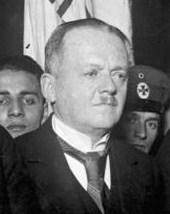Kuno von Westarp
Kuno von Westarp | |
|---|---|
 Westarp in 1924 | |
| Chairman of the German National People's Party | |
| In office 24 March 1926 – 20 October 1928 | |
| Preceded by | Johann Friedrich Winckler |
| Succeeded by | Alfred Hugenberg |
| Member of the Reichstag | |
| In office 24 June 1920 – 4 June 1932 | |
| Constituency | Potsdam II |
| Personal details | |
| Born | 12 August 1864 Ludom, Province of Posen Kingdom of Prussia |
| Died | 30 July 1945 (aged 80) Berlin, Germany |
| Political party | |
| Occupation | Jurist |
| This article is part of a series on |
| Conservatism in Germany |
|---|
 |
Count Kuno Friedrich Viktor von Westarp (12 August 1864 – 30 July 1945) was a conservative politician in Germany.
Life and career
Westarp was born in
In 1887 he began his career in civil service at the administrative district (Landkreis) office in Freienwalde, Brandenburg whose head was Theobald von Bethmann Hollweg, the later Chancellor of Germany. After his second Staatsexamen in 1891 Westarp continued his career as an assessor in Gostyn and Bomst in Posen, and in Stettin. He joined the service of the Prussian State Ministry in 1902 and became Chief of Police in the Schöneberg and Wilmersdorf suburbs of Berlin, before in 1908 he was appointed a senior judge at the Prussian administrative court.
Westarp had joined the

After the
In 1925 the DNVP had temporarily abandoned its anti-republican attitude by joining the German cabinet in a liberal-conservative
Westarp did not stand for another seat in the
Literature
- Graf von Westarp, Kuno; Mayer, Karl J.; Weber, Reinhold (2001). Freiherr Hiller von Gaertringen, Friedrich (ed.). Konservative Politik im Übergang vom Kaiserreich zur Weimarer Republik. Quellen zur Geschichte des Parlamentarismus und der politischen Parteien (in German). Vol. 10. Düsseldorf: Droste. ISBN 3-7700-5239-0.
